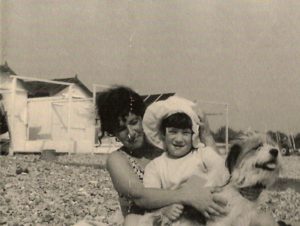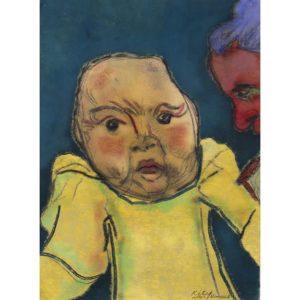The scene on a bus the other day reminded me that we are not all natural mothers. The young woman looked desperate as her baby, scarlet with rage, screamed and screamed and screamed. I remembered just how it had felt. The angry mutter of a city gent – ‘I hope I never find myself in a carriage with you and your child and your dog again’ – as we bundled off the train in Worthing. The tantrum at the end of a birthday party when my three-year-old didn’t want to give away the going-away presents . . .

With Aaron and Patch on Worthing beach
The myth of the happy, dimpled baby is hard to dispel. If mothers only knew what they were in for. Hours spent alone with a small person who can’t talk to you. Can’t tell you why he is screaming the house down. Can’t tell you what it is that he wants. The broken nights, the broken days . . .
I can still remember the day when there was a knock at the door and two little girls asked if they could wheel my baby round the block. I had reached the point which many new mothers – especially single mothers – will recognise; when they would be ready to hand their offspring over to Dracula himself.
Of course, I didn’t. But I did put the now beaming infant in his pram and we all walked down the road to meet the children’s mother. Nothing could have been more reassuring. Mrs B, a cleaning lady, and Ron, a handyman, along with their two daughters became – and still are – a part of our lives.
For Mrs B (or Auntie Doll, as she was to become) babies and small children were no more trouble than the dogs, cats and rabbits that all lived, happy and well cared for, in that small terraced house where my five-year-old would later stay for two whole weeks while I went to St Louis, Missouri, to visit the man who would soon become my second husband.
Those two weeks gave my son, an only child, a precious taste of family life: sleeping on a put-up bed between the two little girls, doing everything to the background of non-stop television, drinking lots of sugary tea . . . and, perversely, happily doing what he was told!
He told me, not so long ago, how safe it made him feel to know that Doll meant what she said.
What supremely good luck it was that these people lived round the corner. Doll would not have believed how difficult and isolating I and many of my friends found those early years.

Mother and Child (after Vincent) by R.B. Kitaj
Mother love, the overwhelming love that nothing can extinguish and remains as powerful a force when one’s child is no longer a child, does not preclude moments of desperation. When I chose this painting of Kitaj’s for the jacket of a novel which was, in effect, one long and powerful scream, it was in recognition of something I knew about for myself.